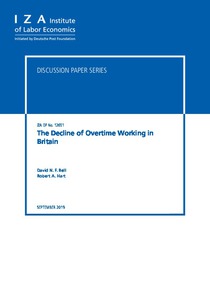The decline of overtime working in Britain

Bell, David N.F. ; Hart, Robert A.
Institute of Labor Economics, Bonn
IZA - Bonn
2019
33 p.
Discussion Paper
12651
Working time and leave
English
Bibliogr.;Statistics
"The share of overtime hours within total hours worked in Britain has declined from 4.8% to 2.9% between 1999 and 2018. This is equivalent to 321 thousand full-time jobs. We investigate this decline focussing on full-time and part-time males and females together with overtime pay effects that include the implications for the gender pay gap. We test for economic, structural and cyclical influences via a two-part regression model that allows us to differentiate between the incidence of overtime working and the average weekly hours of overtime workers. This investigation features collective bargaining coverage, job mobility, the minimum wage, industrial composition and the public/private sector dichotomy. The analysis covers the whole economy embracing nineteen 1-digit industries as well as a separate insight into the manufacturing industry where we feature vehicle manufacture."
Digital
The ETUI is co-funded by the European Union. Views and opinions expressed are however those of the author(s) only and do not necessarily reflect those of the European Union or the ETUI.